塑料垃圾对海洋生物的影响(英文)最新PPT课件
- 格式:ppt
- 大小:3.62 MB
- 文档页数:17
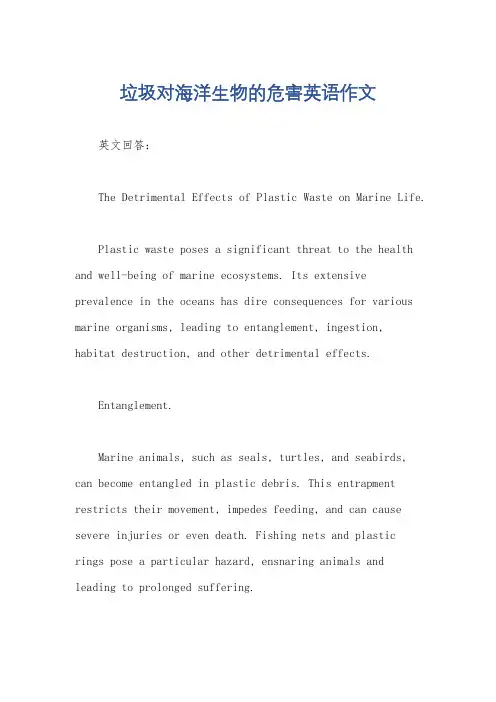
垃圾对海洋生物的危害英语作文英文回答:The Detrimental Effects of Plastic Waste on Marine Life.Plastic waste poses a significant threat to the health and well-being of marine ecosystems. Its extensive prevalence in the oceans has dire consequences for various marine organisms, leading to entanglement, ingestion,habitat destruction, and other detrimental effects.Entanglement.Marine animals, such as seals, turtles, and seabirds, can become entangled in plastic debris. This entrapment restricts their movement, impedes feeding, and can cause severe injuries or even death. Fishing nets and plasticrings pose a particular hazard, ensnaring animals and leading to prolonged suffering.Ingestion.Many marine species inadvertently ingest plastic waste, mistaking it for food. This can lead to various health problems, including gastrointestinal issues, malnutrition, and starvation. The ingestion of microplastics (smallplastic particles less than 5 mm in size) is particularly concerning due to their ability to accumulate in the food chain and potentially bioaccumulate in marine organisms.Habitat Destruction.Accumulations of plastic waste can degrade marine habitats, particularly coral reefs and seagrass beds. These habitats provide food and shelter for a wide range of species, but their integrity is compromised by the accumulation of plastic debris. Moreover, plastic waste can smother marine organisms, such as shellfish and sea urchins, reducing their ability to survive and reproduce.Other Impacts.In addition to the direct effects of entanglement, ingestion, and habitat destruction, plastic waste also indirectly impacts marine life. For instance, plastic pollution can absorb toxic chemicals from the environment and release them into the water, contaminating the marine food chain. Furthermore, plastic waste can serve asbreeding grounds for harmful microorganisms, further exacerbating the detrimental effects on marine ecosystems.Mitigation Strategies.Addressing the problem of plastic pollution requires a comprehensive approach. Key mitigation strategies include:Reducing the production and consumption of single-use plastics.Improving waste management practices.Promoting recycling and upcycling of plastic materials.Raising awareness about the impacts of plastic wasteon marine life.Supporting research and innovation to develop sustainable alternatives.By implementing these measures, we can help safeguard marine ecosystems and ensure the well-being of marine life for generations to come.中文回答:塑料垃圾对海洋生物的破坏性影响。
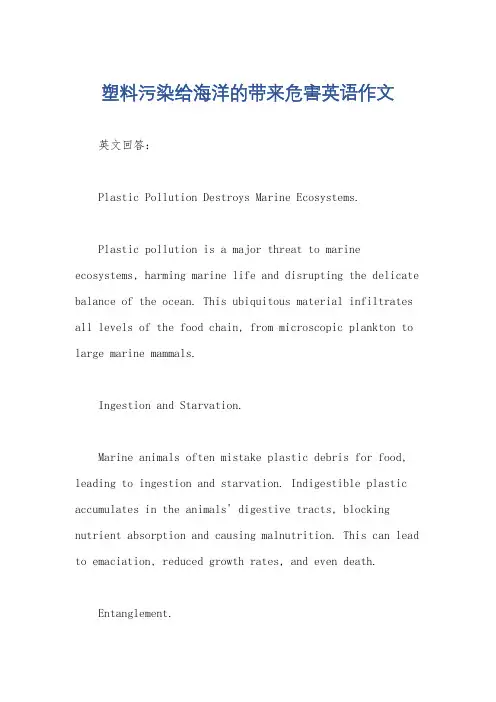
塑料污染给海洋的带来危害英语作文英文回答:Plastic Pollution Destroys Marine Ecosystems.Plastic pollution is a major threat to marine ecosystems, harming marine life and disrupting the delicate balance of the ocean. This ubiquitous material infiltrates all levels of the food chain, from microscopic plankton to large marine mammals.Ingestion and Starvation.Marine animals often mistake plastic debris for food, leading to ingestion and starvation. Indigestible plastic accumulates in the animals' digestive tracts, blocking nutrient absorption and causing malnutrition. This can lead to emaciation, reduced growth rates, and even death.Entanglement.Plastic entanglement is another significant hazard to marine life. Animals can become entangled in discarded fishing gear, plastic bags, and other debris, restricting their movement and causing injuries. Entangled animals may struggle to feed, swim, or breathe, leading to prolonged suffering or death.Chemical Leaching.Plastic materials contain a variety of chemical additives and plasticizers that can leach into the marine environment. These chemicals can have toxic effects on marine organisms, disrupting their hormonal balance, reproductive systems, and immune functions.Habitat Degradation.Plastic pollution accumulates in marine habitats, smothering coral reefs, seagrass beds, and other vital ecosystems. This degradation reduces biodiversity, disrupts food chains, and impairs the overall health of the ocean.Ghost Fishing.Abandoned or lost fishing gear made of plastic continues to capture and kill marine life in a process known as "ghost fishing." These nets and traps entangle fish, sea turtles, and other animals, leading to population declines and ecosystem disruption.Plastic Pollution Endangers Human Health.Marine plastic pollution can also pose risks to human health. Microplastics, tiny pieces of plastic less than 5mm in size, are ingested by marine organisms and can accumulate in the food chain, eventually reaching human consumers. These microplastics may contain harmful chemicals that can have adverse effects on human health.Addressing the Plastic Pollution Crisis.Addressing the plastic pollution crisis requires a multifaceted approach that involves reducing plasticproduction, improving waste management, and promoting sustainable alternatives. Governments, industries, and individuals must collaborate to implement effectivesolutions and protect marine ecosystems for future generations.中文回答:塑料污染破坏海洋生态系统。
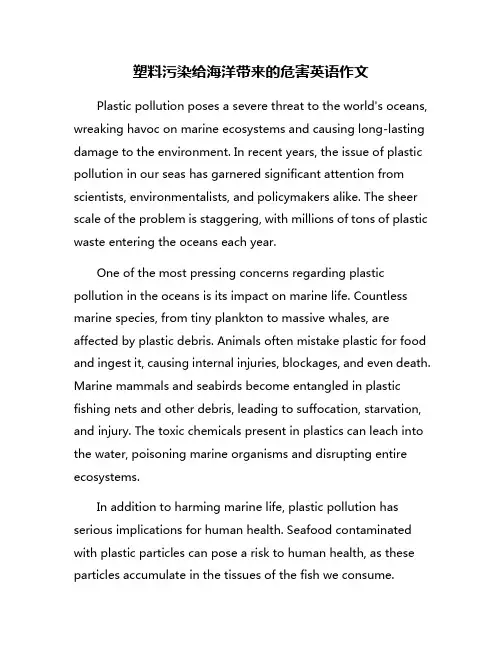
塑料污染给海洋带来的危害英语作文Plastic pollution poses a severe threat to the world's oceans, wreaking havoc on marine ecosystems and causing long-lasting damage to the environment. In recent years, the issue of plastic pollution in our seas has garnered significant attention from scientists, environmentalists, and policymakers alike. The sheer scale of the problem is staggering, with millions of tons of plastic waste entering the oceans each year.One of the most pressing concerns regarding plastic pollution in the oceans is its impact on marine life. Countless marine species, from tiny plankton to massive whales, are affected by plastic debris. Animals often mistake plastic for food and ingest it, causing internal injuries, blockages, and even death. Marine mammals and seabirds become entangled in plastic fishing nets and other debris, leading to suffocation, starvation, and injury. The toxic chemicals present in plastics can leach into the water, poisoning marine organisms and disrupting entire ecosystems.In addition to harming marine life, plastic pollution has serious implications for human health. Seafood contaminated with plastic particles can pose a risk to human health, as these particles accumulate in the tissues of the fish we consume.Moreover, microplastics – tiny plastic particles that result from the breakdown of larger plastic items – are present in many everyday products, such as cosmetics and cleaning agents. These microplastics can enter the food chain and eventually make their way into our bodies, with potential adverse health effects.The economic costs of plastic pollution in the oceans are also significant. Coastal communities that rely on fishing and tourism as sources of income are particularly vulnerable to the impacts of plastic pollution. Beaches strewn with plastic debris are unattractive to tourists, leading to decreased revenues for local businesses. Furthermore, the costs of cleaning up and mitigating the effects of plastic pollution on marine ecosystems are substantial, placing a burden on governments and taxpayers.Despite the seriousness of the problem, there is hope for the future. Efforts are underway around the world to reduce plastic pollution and protect our oceans. Many countries have implemented bans on single-use plastics, such as plastic bags and straws, in an effort to curb the flow of plastic waste into the seas. Innovative technologies are being developed to remove plastic debris from the oceans, while initiatives to promote recycling and waste reduction are gaining momentum.Individuals can also play a role in combating plastic pollution by reducing their use of single-use plastics, properly disposing of waste, and participating in beach clean-up efforts. By raising awareness about the issue and advocating for sustainable solutions, we can all contribute to a cleaner, healthier ocean environment for future generations.In conclusion, plastic pollution poses a serious threat to the world's oceans, with far-reaching implications for marine life, human health, and the economy. However, by taking action to reduce plastic waste, implement sustainable practices, and support conservation initiatives, we can help protect our oceans and ensure a brighter future for our planet.。

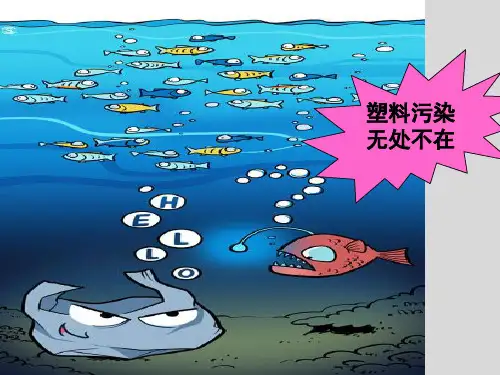
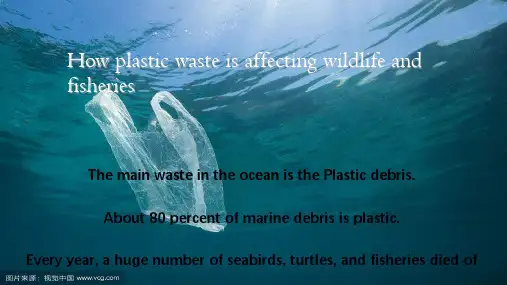
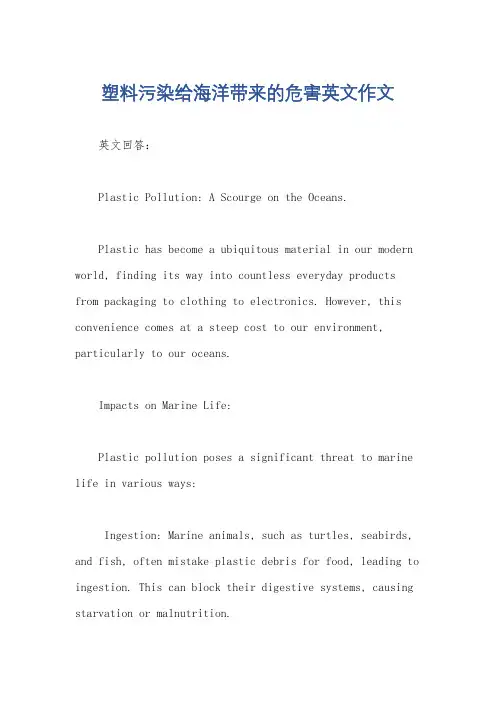
塑料污染给海洋带来的危害英文作文英文回答:Plastic Pollution: A Scourge on the Oceans.Plastic has become a ubiquitous material in our modern world, finding its way into countless everyday products from packaging to clothing to electronics. However, this convenience comes at a steep cost to our environment, particularly to our oceans.Impacts on Marine Life:Plastic pollution poses a significant threat to marine life in various ways:Ingestion: Marine animals, such as turtles, seabirds, and fish, often mistake plastic debris for food, leading to ingestion. This can block their digestive systems, causing starvation or malnutrition.Entanglement: Plastic items like fishing nets and packaging can entangle marine animals, restricting their movement, causing injury, and potentially leading to death.Toxic Effects: Plastic contains various chemicals that can leach into the marine environment. These chemicals can accumulate in marine organisms, causing developmental abnormalities, reproductive problems, and immune system dysfunction.Habitat Degradation: Plastic litter can smother coral reefs, seagrass beds, and other important marine habitats, impairing their ecological function and reducing biodiversity.Disruption of Marine Ecosystems:Plastic pollution also disrupts the delicate balance of marine ecosystems:Food Web Disruption: Plastic debris introduced intothe food chain can alter the availability and safety of food sources for marine organisms at all trophic levels.Nutrient Cycling: Plastics can adsorb nutrients from water, affecting the nutrient availability for primary producers like phytoplankton, which are the foundation of marine food webs.Ocean Acidification: Some types of plastic release carbon dioxide as they degrade, contributing to ocean acidification, which can harm marine organisms and coral reefs.Economic and Social Impacts:Plastic pollution also has economic and social consequences:Tourism and Recreation: Plastic litter degrades coastal environments, affecting tourism and recreational activities like swimming and fishing.Fishing Industry: Plastic entanglement can damage fishing gear and reduce fish populations, impacting livelihoods and food security.Coastal Infrastructure: Plastic litter can clog drains and waterways, causing flooding and sewage contamination.Addressing the Problem:Addressing plastic pollution in the oceans requires a multifaceted approach:Reducing Plastic Production and Consumption: Reducing the production and consumption of single-use plastics is crucial to minimizing the amount of plastic entering the marine environment.Improving Waste Management: Implementing effective waste management systems to prevent plastic from entering waterways is essential.Promoting Sustainable Practices: Encouraging the useof biodegradable or reusable alternatives to plastic products can help reduce overall plastic pollution.Raising Awareness: Raising public awareness about the impacts of plastic pollution and promoting responsible disposal practices is crucial for long-term solutions.Conclusion:Plastic pollution is a significant threat to the health of our oceans and the well-being of marine life. Urgent action is needed to reduce plastic production, improve waste management, and promote sustainable practices. By working together, we can mitigate the devastating impacts of plastic pollution and protect the future of our marine ecosystems.中文回答:塑料污染对海洋的危害。
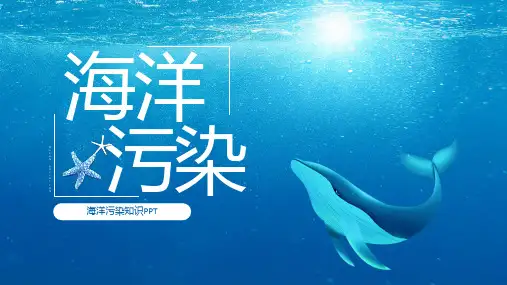
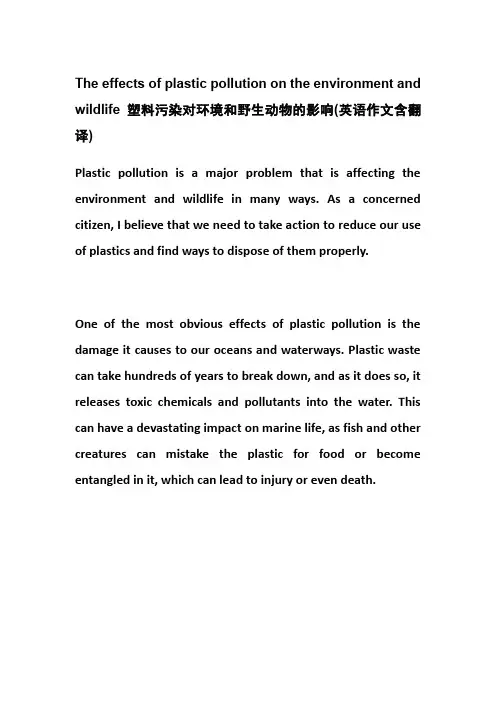
The effects of plastic pollution on the environment and wildlife塑料污染对环境和野生动物的影响(英语作文含翻译)Plastic pollution is a major problem that is affecting the environment and wildlife in many ways. As a concerned citizen, I believe that we need to take action to reduce our use of plastics and find ways to dispose of them properly.One of the most obvious effects of plastic pollution is the damage it causes to our oceans and waterways. Plastic waste can take hundreds of years to break down, and as it does so, it releases toxic chemicals and pollutants into the water. This can have a devastating impact on marine life, as fish and other creatures can mistake the plastic for food or become entangled in it, which can lead to injury or even death.Plastic pollution also affects our land and air. When plastics are not properly disposed of, they can accumulate in landfills and other areas, leading to litter and pollution. In addition, when plastic waste is burned, it releases harmful chemicals and toxins into the air, which can have serious health consequences for humans and animals alike.Furthermore, plastic pollution has a significant impact on wildlife. Animals such as birds, turtles, and whales can easily mistake plastic for food, leading to ingestion and suffocation. This can cause significant harm to wildlife populations and lead to a reduction in biodiversity.Despite these negative impacts, there are ways that we can all work to reduce plastic pollution. We can start by reducing our use of single-use plastics such as straws, water bottles, and plastic bags. We can also recycle plastics and dispose of them properly. By taking small steps, we can all make a difference in reducing the amount of plastic pollution that ends up in our environment.In conclusion, plastic pollution is a serious problem that requires action on a global scale. It is our responsibility as citizens to do our part in reducing our use of plastics and properly disposing of them. By working together, we can help protect our environment and the wildlife that calls it home.塑料污染是一个以多种方式影响环境和野生动物的主要问题。
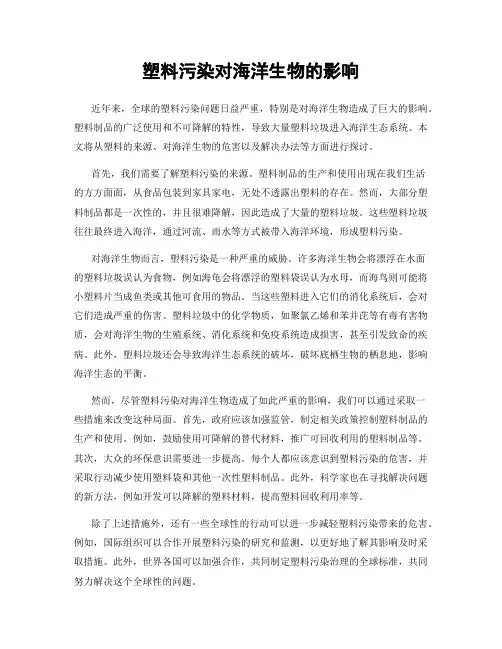
塑料污染对海洋生物的影响近年来,全球的塑料污染问题日益严重,特别是对海洋生物造成了巨大的影响。
塑料制品的广泛使用和不可降解的特性,导致大量塑料垃圾进入海洋生态系统。
本文将从塑料的来源、对海洋生物的危害以及解决办法等方面进行探讨。
首先,我们需要了解塑料污染的来源。
塑料制品的生产和使用出现在我们生活的方方面面,从食品包装到家具家电,无处不透露出塑料的存在。
然而,大部分塑料制品都是一次性的,并且很难降解,因此造成了大量的塑料垃圾。
这些塑料垃圾往往最终进入海洋,通过河流、雨水等方式被带入海洋环境,形成塑料污染。
对海洋生物而言,塑料污染是一种严重的威胁。
许多海洋生物会将漂浮在水面的塑料垃圾误认为食物,例如海龟会将漂浮的塑料袋误认为水母,而海鸟则可能将小塑料片当成鱼类或其他可食用的物品。
当这些塑料进入它们的消化系统后,会对它们造成严重的伤害。
塑料垃圾中的化学物质,如聚氯乙烯和苯并芘等有毒有害物质,会对海洋生物的生殖系统、消化系统和免疫系统造成损害,甚至引发致命的疾病。
此外,塑料垃圾还会导致海洋生态系统的破坏,破坏底栖生物的栖息地,影响海洋生态的平衡。
然而,尽管塑料污染对海洋生物造成了如此严重的影响,我们可以通过采取一些措施来改变这种局面。
首先,政府应该加强监管,制定相关政策控制塑料制品的生产和使用。
例如,鼓励使用可降解的替代材料,推广可回收利用的塑料制品等。
其次,大众的环保意识需要进一步提高。
每个人都应该意识到塑料污染的危害,并采取行动减少使用塑料袋和其他一次性塑料制品。
此外,科学家也在寻找解决问题的新方法,例如开发可以降解的塑料材料,提高塑料回收利用率等。
除了上述措施外,还有一些全球性的行动可以进一步减轻塑料污染带来的危害。
例如,国际组织可以合作开展塑料污染的研究和监测,以更好地了解其影响及时采取措施。
此外,世界各国可以加强合作,共同制定塑料污染治理的全球标准,共同努力解决这个全球性的问题。
总结起来,塑料污染对海洋生物造成了巨大的危害。
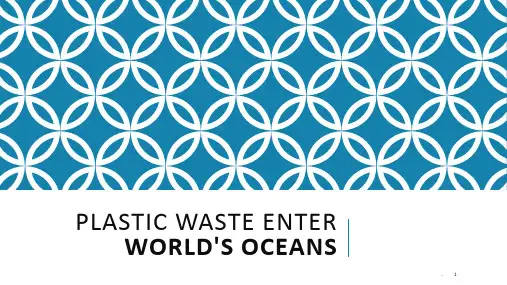
塑料污染给海洋带来的危害英语作文英文回答:Plastic Pollution and Its Detrimental Effects on Marine Ecosystems.Plastic pollution has emerged as a pervasive threat to the marine environment, posing significant risks to its biodiversity and ecological balance. This ubiquitous material accumulates in vast quantities within the ocean's ecosystems, leading to a myriad of detrimental consequences for marine life.1. Ingestion and Starvation:Marine organisms, from microscopic zooplankton to colossal whales, inadvertently ingest plastic particlesthat often resemble food sources. Ingestion of tiny plastic fragments can block digestive tracts, leading to starvation and even death. Moreover, plastics can leach toxicchemicals into the digestive system, causing internal damage and impairing nutrient absorption.2. Entanglement and Suffocation:Larger plastic debris, such as discarded fishing gear, entangles marine animals, restricting their movement and causing injuries. Entangled individuals may become unable to feed, reproduce, or avoid predators. Severe entanglements can lead to lacerations, infections, and ultimately death by suffocation or drowning.3. Habitat Degradation:Plastic pollution accumulates in marine habitats, transforming their physical and chemical properties. Discarded plastic bags, bottles, and other debris can smother coral reefs, seagrass beds, and other critical habitats. Plastic particles also adsorb and concentrate toxic compounds, creating hazardous environments for marine organisms.4. Reproductive Impairment:Exposure to plastic pollution can have profound effects on the reproductive health of marine species. Chemicals leached from plastics can disrupt hormonal balance, leading to reduced fertility and impaired reproductive success. In some cases, plastic particles can mimic natural hormones, causing abnormal development and reproductive dysfunction.5. Ecosystem-wide Impacts:The accumulation of plastic pollution in the marine environment disrupts ecosystem dynamics. Plastic particles can alter the food chain by reducing the availability of prey species or by introducing new contaminants into the system. Persistent plastic debris can also act as a physical barrier, hindering the movement of organisms and disrupting ecological processes.中文回答:塑料污染对海洋环境的危害。
A staggering 8m tonnes of plastic waste are entering the world’s oceans every year, or the equivalent to five grocery bags filled with plastic for every foot of coastline in the world, according to the first scientific assessment of the problem. 根据对海上塑料垃圾问题的首次科学评估,全球每年流入海洋的塑料垃圾达到令人震惊的800万吨,相当于全球每英尺海岸线都流入5只塞满塑料的食品袋。
The joint US-Australian study, released at the American Association for the Advancement of Science annual meeting in San Jose, analysed waste productiondata from 192 countries to conclude that between 4.8m and 12.7m tonnes of “mismanaged plastic” entered the oceans in 2010; 8m tonnes is the central estimate. 这一由美国和澳大利亚联合开展的研究,是在美国科学促进会(American Association for the Advancement of Science)圣何塞年度会议上公布的。
该报告根据来自192个国家的垃圾产出数据,经分析得出,2010年流入海洋的“不受管理的塑料垃圾”在480万吨到1270万吨之间,800万吨的数据是上述区间取中位数得出的估计结果。
Plastic in the oceans is becoming a serious ecological problem for marine life, as well as an ugly pollutant washed up on beaches and floating on the open seas. 塑料垃圾不但是海岸上及海面上影响观感的废弃污染物,对于海洋生物来说,它们正成为严重的生态问题。
塑料污染对海洋生态的威胁Plastic Pollution: A Threat to Marine EcosystemThe issue of plastic pollution has become a growing concern for many countries around the world. Plastic debris, if not disposed of properly, can cause serious harm to the environment particularly to marine life. This article delves into the perils of plastic pollution and how it threatens the delicate balance of our oceans.It is estimated that 8 million metric tons of plastic waste enter the ocean every year. This is equivalent to a garbage truck full of plastic being dumped into the ocean every minute. The impact of plastic pollution on marine life is alarming. Once in the ocean, plastics break down into smaller pieces, known as microplastics. These microplastics are often mistaken for food by marine animals and can cause suffocation, starvation, entanglement, and other physical harm.The most affected marine species are sea turtles, seabirds, and marine mammals such as whales, dolphins, and seals. They often ingest plastic debris and get entangled in discarded fishing nets which result in injuries, amputations, and deaths. Plastic pollution can also threaten the livelihood of coastal communities that rely on fishing, ecotourism, and other maritime activities.Apart from harming marine life, plastic pollution also has serious consequences for human health. When we consume seafood contaminated with microplastics, the toxic chemicals found in plastic can enter our body and affect our health. The impact of plastic pollution on human health is notfully understood yet, but studies have shown that plastic can disrupt the endocrine system, cause cancer, and affect reproductive health.The problem of plastic pollution requires a holistic approach. It calls for collective efforts from individuals, governments, and businesses to reduce plastic waste, promote sustainable practices, and invest in environmentally friendly alternatives. Many countries have taken steps towards addressing the plastic pollution crisis by banning single-use plastics, developing recycling programs, and promoting eco-friendly choices.As individuals, we can also do our part by adopting the three Rs: reduce, reuse, and recycle. We can refuse single-use plastics, bring our own bags, cups, and water bottles, and support businesses that are committed to reducing plastic waste.In conclusion, plastic pollution poses a serious threat to marine life, human health, and our planet as a whole. It is crucial that we take action to address this issue and protect the oceans that sustain life on Earth. By working together, we can create a sustainable future for ourselves and the generations to come. As Sylvia Earle once said, “No water, no life. No blue, no green.”。
塑料给海洋带来的危害英语作文英文回答:Plastics are a major threat to our oceans. They are a major source of pollution, and they can have a devastating impact on marine life.How do plastics end up in the ocean?Plastics can enter the ocean from a variety of sources, including:Littering: People often litter plastic bags, bottles, and other plastic items on beaches and in other coastal areas.Illegal dumping: Some businesses and individuals illegally dump plastic waste into the ocean.Runoff: Plastic waste can also be washed into theocean from storm drains and rivers.What are the impacts of plastics on marine life?Plastics can have a variety of negative impacts on marine life, including:Entanglement: Marine animals can become entangled in plastic bags, bottles, and other plastic items. Entanglement can cause injury, starvation, and death.Ingestion: Marine animals can also ingest plastic particles. Plastic particles can block the digestive tract, causing starvation or death.Toxicity: Some plastic chemicals can be toxic tomarine animals. These chemicals can cause a variety ofhealth problems, including cancer and reproductive problems.What can we do to reduce the impact of plastics on oceans?There are a number of things we can do to reduce the impact of plastics on oceans, including:Reduce our use of plastics: We can reduce our use of plastics by choosing reusable items over disposable ones, and by recycling plastic products.Dispose of plastics properly: We should always dispose of plastic waste in designated trash receptacles.Support organizations that are working to reduce plastic pollution: There are a number of organizations that are working to reduce plastic pollution in oceans. We can support these organizations by donating money or volunteering our time.中文回答:塑料给海洋带来的危害。
海洋塑料污染对海洋生物的影响海洋塑料污染是指在海洋中存在大量塑料垃圾,对海洋生物和整个生态系统造成严重影响的问题。
塑料是一种常见的人造材料,在日常生活中广泛应用,但它的分解性较差,造成了海洋环境的严重污染。
本文将探讨海洋塑料污染对海洋生物的影响。
1. 给海洋生物带来直接威胁海洋塑料垃圾对海洋生物的生存和繁殖具有直接的威胁。
许多海洋生物误食塑料垃圾,这会造成食物链的中断和生物内部的损害。
例如,海洋鸟类误食浮游塑料小颗粒,这会导致它们的胃中充斥着塑料垃圾而无法摄取足够的食物,最终导致其死亡。
2. 影响生物的生长和发育海洋塑料污染对海洋生物的生长和发育也带来了负面影响。
许多海洋生物的幼体或卵被塑料袋、塑料网和其他塑料制品所覆盖,无法正常呼吸和获取养分,导致过早死亡或生长发育异常。
3. 污染海洋食物链海洋塑料垃圾会进一步污染海洋食物链。
海洋生物误食塑料垃圾,从而将其转化为能量更高的捕食性生物的食物。
而随着食物链的扩大,塑料垃圾中的化学物质也会进一步积累在更高层次的食物中,对海洋生物造成更大的危害。
4. 破坏海洋生态系统平衡海洋塑料污染会破坏海洋生态系统的平衡。
塑料垃圾不仅影响海洋生物的生存和繁殖,还对珊瑚礁和海草床等生态系统造成直接破坏。
这些生态系统是许多海洋生物的栖息地和摄食场所,它们的破坏将导致整个生态系统的崩溃。
5. 威胁人类健康海洋塑料污染不仅对海洋生物造成影响,也会威胁到人类的健康。
海洋生物误食塑料垃圾后,其中的化学物质会通过食物链进入到人类的食物系统中。
这些化学物质对人体健康具有潜在危害,如内分泌干扰和致癌物质的存在。
结论海洋塑料污染对海洋生物产生了广泛而深远的影响,这不仅对海洋生态系统造成破坏,也威胁到人类的健康。
为了保护海洋生物和维护海洋生态平衡,我们需要采取积极的措施减少塑料使用、加强垃圾分类和回收,以及加强公众意识的提高,共同应对海洋塑料污染问题。
APlasticOcean塑料海洋
A Plastic Ocean <塑料海洋>
一只被塑料垃圾缠绕住的海豹。
大家好呀,我是Lucas。
因为我们的第一篇文章进展缓慢
,我想先和大家分享一部记录片——A Plastic Ocean <塑料海洋>。
在这部纪录片四年的制作时间里,一支由冒险家和研究人员组成的团队远赴世界各地的20个地点进行考察,想要找到塑料污染对全球,尤其是对我们脆弱的海洋的影响。
这部纪录片包含了大量让人不不寒而栗的事实和数据来披露他们的发现,例如,研究人员在一只90天大的海鸟的身体里发现了276块塑料(这相当于我们肚子里的12块披萨)。
从中我们也可以接触到诸如大太平洋垃圾带的知识。
发现问题只是第一步,除了影响以外,这部纪录片还提出了一些——能让情况改善的——可行的技术和可能的解决方案。
值得注意的是,这是一部2016年的记录片,在过去三年的时间里,塑料污染所导致问题正在不断的恶化与加剧。
一只死去的信天翁肚子里装满了塑料碎片。
大太平洋垃圾带。
这部纪录片最早是学校组织我们观看的。
对我而言,其中不同的事实和数据,前所未见的画面真的深深地震撼了我,也让我意识到环境保护将会是我们这一代人的重任。
我在Bilibili上找到了这部纪录片,带有中文字幕。
我希望大家能够喜欢,也希望它能让大家开始了解塑料污染,引起大家的警觉。
最后让我们来看一看它的预告片吧。